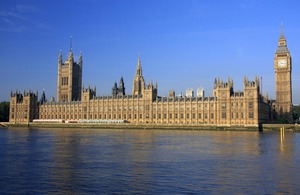Royal Assent for Growth and Infrastructure Act
The successful passage of the government’s flagship growth legislation signals extra momentum towards economic growth, new homes and jobs.

Parliament
Reforms to reduce the bureaucratic barriers that stop British business from successfully creating economic growth and local jobs became law today (25 April 2013) following the Royal Assent of Her Majesty Queen Elizabeth II.
The ‘Growth and Infrastructure Act 2013’ will help the country compete on the global stage by introducing a comprehensive series of practical measures to reduce confusing and overlapping red tape that delays and discourages business investment, housing development, new infrastructure and job creation.
The main elements of the Act and its associated measures will:
Kick-start urgently needed major infrastructure work that will generate thousands of new jobs and billions in new investment. This will: remove a regulatory barrier to a £160 million investment programme in the gas network; give developers of large scale business and commercial development the option to fast-track major projects while keeping community consultation; and speed up super-fast broadband roll-out to local homes and firms, especially in rural Britain facing a ‘digital divide’.
Get building going on stalled housing sites by allowing the reconsideration of economically unviable requirements called Section 106 agreements. These unrealistic conditions have meant no development, no regeneration and no community benefits. This could unblock 75,000 stalled homes. Separately 15,000 affordable homes will be delivered from new capital funding and the infrastructure guarantee.
Help families to improve their home by reforming permitted development householder rights to remove excessive red tape on uncontentious, small-scale extensions, and make sure adjoining neighbours are consulted when the new rights are used.
Speed up development procedures with a simpler planning system that supports sustainable growth. This includes reducing the volume of extra paperwork required with a planning application; removing over-lapping development consent regimes that require multiple extra permissions from different government agencies; and allow planning applications to go to the Planning Inspectorate where a council has consistently failed to meet statutory requirements to consider applications on time.
Creating a new employment status of ‘employee shareholder’ that will give individuals the opportunity to share in the potential rewards of a company, and that will give companies more choice and flexibility in how they manage their business.
Prevent unexpected hikes in business rates on local firms over the next 5 years. Tax stability is vital as business rates are the third biggest outgoing for firms.
Reform legislation on town and village greens to remove an overlapping consent process from the registration system that conflicts with the democratically accountable planning system. The existing strong protection for registered greens is unchanged.
Communities and Local Government Secretary Eric Pickles said:
The common sense reforms in this Act will make it possible for local businesses to grow and to create the jobs and opportunities people need to get on in life.
It will unlock British entrepreneurship that has been jammed up for too long in red tape whilst ensuring democratic checks and environmental safeguards remain in place.
Planning Minister Nick Boles said:
The Growth and Infrastructure Act is a major landmark for the coalition government. These new laws will reform our economy so it can boost investment, growth and jobs by streamlining a lot of confusing and overlapping red tape that all too often gets in the way of people’s everyday lives.